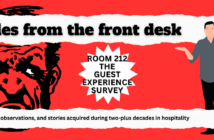AAHOA’s partnership with Businesses Ending Slavery & Trafficking (BEST) to enhance training for hotel workers
THE SAME TECHNOLOGIES that are helping hoteliers deal with shifting customer-service expectations and the national labor shortage can bolster their efforts to combat sex trafficking at their properties. But, since technology is a double-edged sword, those same solutions can help sex traffickers avoid being detected by hotel workers and guests, potentially worsening this growing problem.
That’s a major underpinning of AAHOA’s ongoing partnership with Businesses Ending Slavery and Trafficking (BEST), with the shared goal of enhancing an important training program aimed at raising hotel workers’ awareness and how to spot the signs of sex trafficking. Launched in 2016, the “BEST Inhospitable to Human Trafficking Training, Sponsored by AAHOA” program has been updated and improved this year to include a greater focus on the role of new technologies.
Dr. Mar Brettmann, BEST’s chief executive and executive director, said hotel workers are on the front lines of this issue. Her organization provides training resources about sex trafficking that any business can use, and it holds seminars on the topic for a variety of industries, including maritime shipping and air travel.
But Brettmann singled out AAHOA Members and the hotel industry for accepting a leading role in addressing an issue that affects an estimated 20.9 million victims worldwide and amounts to a $150 billion industry, according to the National Human Trafficking Resource Center.
“We’ve had a long partnership with AAHOA, and we’re excited to see it continue because the hotel industry is leading the way for other industries on this issue,” Brettmann said. “The hotel industry really is the model for how an industry can proactively take on the issue of trafficking and try to prevent it, and training their staff has been the key to that. We would love to see other industries do as much as the hotel industry is doing.”
WHAT WE DO DEFINES US
While technological solutions such as keyless entry and mobile check-in and checkout allow hotels to get by with fewer workers and streamline their guest services, they do come with drawbacks, Brettmann said. Sex traffickers now have a greater ability to avoid interaction with guests in the lobby and hotel workers who are trained to recognize the signs of sexual exploitation.
On the flipside, high-definition security cameras and hospitality software platforms are making it easier for hoteliers to identify suspicious activity.
Hotel workers can use cameras to monitor parking lots and hallway corridors for unusually high levels of traffic. In addition, software platforms can alert workers when a guest’s room door is being opened and closed with great frequency or when access doors on the side of the hotel are propped open, allowing johns to come and go without entering the lobby.
“Hotels are moving toward having less staff and using contactless technologies, and that poses a challenge because we’ve traditionally relied on hotel workers at the front desk or in housekeeping to identify signs of sex trafficking,” Brettmann said. “Those are some of the issues we’re working to develop solutions to.”
The enhanced training program, developed by BEST, includes a focus on unconscious bias and how it can lead workers to miss signs of sex trafficking or wrongfully assume that exploitation is taking place.
Boys and men account for 29% of all trafficking victims, according to Free the Slaves, a Washington, D.C.-based advocacy group focused on ending sex and labor trafficking. Many of these victims go unrecognized because they appear to be physically strong enough to fight back against traffickers, so the public ignores other possible signs of trafficking, Brettmann said.
Similarly, societal stereotypes can lead hotel workers and guests to jump to the wrong conclusion, exposing guests to embarrassment and unwarranted questioning by law enforcement. In one case, police were allegedly called simply because a white man was with a child from a racial minority, and it turned out that the man was the child’s parent, Brettmann said.
In other cases, hotel employees erroneously assumed transgender guests were involved in sex work or that young Black girls were voluntarily engaging in prostitution when, in fact, they were being held against their will, she added.
“It’s really important that people aren’t just looking at appearances to identify cases of trafficking,” Brettmann said. “That’s why we’re focused on behavior-based indicators that raise concerns regardless of what the person looks like.”
Those indicators include signs of physical abuse and control. Victims may have bruises, lack access to forms of identification, money, and a phone, or show confusion about their current or previous whereabouts, the latter of which is a possible sign that they’ve been drugged or moved around a lot by pimps, Brettmann noted.
SILENT PROTECTORS
Besides developing training programs, BEST advocates for sex-trafficking victims in numerous ways, including helping them obtain gainful employment and making policy recommendations to lawmakers, Brettmann said.
For example, BEST’s Safe Jobs Collaborative is a partnership with social-service agencies and employers in King County, WA, to provide internships and job opportunities to survivors of sex trafficking and those at risk. Participating employers receive applications from qualified job seekers who are prescreened and receive ongoing job-readiness training and support from social service agencies.
Employers also get help with onboarding, training to address stress, trauma, and resilience in the workplace, and public recognition from BEST. So far, Brettman said, the collaborative has helped 424 trafficking survivors and people at risk find jobs.
Meanwhile, BEST is making policy recommendations to lawmakers who are considering fully decriminalizing prostitution, sex buying, and pimping in response to the nation’s high rates of incarceration, Brettmann said. She said the majority of sex workers experience coercion from an individual or from difficult life circumstances, and that arresting them isn’t a good solution because it closes off alternative employment options and keeps them trapped in a cycle of violence.
Brettmann said research shows that when prostitution and sex buying are fully decriminalized, demand increases because johns no longer worry about being arrested and publicly humiliated. More demand for prostitution leads to more sex trafficking, she said, so BEST wants laws penalizing buyers and pimps to remain in place.
“Fully decriminalizing sex buying and pimping would pose a real issue for local hotels because sex trafficking will increase,” Brettmann said. “It’s something they need to pay attention to.”
And COVID-19 has only exacerbated the problem of sex trafficking, she said. Children who couldn’t attend school in person were spending more time online, often unsupervised, while their parents worked, making them easier targets for sex traffickers pretending to be children. Kids and young adults have had less interaction with teachers, coaches, church leaders, social workers, and other adults who often identify signs of abuse.
Furthermore, job losses from the pandemic drove many families into poverty, forcing people to do things they normally wouldn’t just to get by. And renewed calls for police reform have led to smaller police departments that lack the manpower and will to crack down on nonviolent crime.
“In the Seattle area, we’re seeing a huge increase in street-based prostitution, and that’s in large part due to COVID-19 as well as changes in policing that have happened during the past year,” Brettmann said. “Lots of people are falling through the cracks, so hotels are on the front lines of this issue even more so than they were before.”




